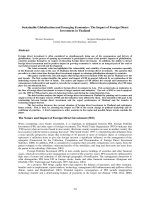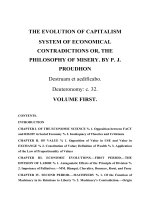Fame And Fortune - Or, The Progress Of Richard Hunter doc
Bạn đang xem bản rút gọn của tài liệu. Xem và tải ngay bản đầy đủ của tài liệu tại đây (1.16 MB, 184 trang )
Fame and Fortune; or,
The Progress of Richard
Hunter
Horatio Alger
RAGGED DICK SERIES
FAME AND FORTUNE;
OR,
THE PROGRESS OF RICHARD HUNTER.
BY HORATIO ALGER, Jr.
AUTHOR OF “RAGGED DICK,” “FRANK’S CAMPAIGN,” “PAUL
PRESCOTT’S CHARGE,” “CHARLIE CODMAN’S CRUISE,” ETC.
LORING, Publisher.
C
OR. BROMFIELD AND WASHINGTON STREETS.
BOSTON.
Entered, according to Act of Congress, in the year 1868, by A. K.
LORING, In the Clerk’s Office of the District Court for the District of
Massachusetts.
To
MY FATHER,
FROM WHOM I HAVE NEVER FAILED TO RECEIVE
LITERARY SYMPATHY AND ENCOURAGEMENT,
This Volume
IS DEDICATED.
PREFACE.
“F
AME AND FORTUNE,” like its predecessor, “Ragged Dick,” was
contributed as a serial story to the “Schoolmate,” a popular juvenile
magazine published in Boston. The generous commendations of the
first volume by the Press, and by private correspondents whose
position makes their approval of value, have confirmed the author in
his purpose to write a series of stories intended to illustrate the life
and experiences of the friendless and vagrant children to be found in
all our cities, numbering in New York alone over twelve thousand.
In the preparation of the different volumes, the requisite information
will be gathered from personal observation mainly, supplemented,
however, by facts communicated by those who have been brought
into practical relations with the class of children whose lives are
portrayed.
The volumes might readily be made more matter-of-fact, but the
author has sought to depict the inner life and represent the feelings
and emotions of these little waifs of city life, and hopes thus to excite
a deeper and more widespread sympathy in the public mind, as well
as to exert a salutary influence upon the class of whom he is writing,
by setting before them inspiring examples of what energy, ambition,
and an honest purpose may achieve, even in their case.
In order to reach as large a number of these boys as possible, the
publisher is authorized, on application, to send a gratuitous copy of
the two volumes of the “Ragged Dick Series” already issued, to any
regularly organized Newsboys’ Lodge within the United States.
N
EW YORK, December, 1868.
Fame and Fortune; or, The Progress of Richard Hunter
1
CHAPTER I.
A BOARDING-HOUSE IN BLEECKER STREET.
“Well, Fosdick, this is a little better than our old room in Mott
Street,” said Richard Hunter, looking complacently about him.
“You’re right, Dick,” said his friend. “This carpet’s rather nicer than
the ragged one Mrs. Mooney supplied us with. The beds are neat
and comfortable, and I feel better satisfied, even if we do have to pay
twice as much for it.”
The room which yielded so much satisfaction to the two boys was on
the fourth floor of a boarding-house in Bleecker Street. No doubt
many of my young readers, who are accustomed to elegant homes,
would think it very plain; but neither Richard nor his friend had
been used to anything as good. They had been thrown upon their
own exertions at an early age, and had a hard battle to fight with
poverty and ignorance. Those of my readers who are familiar with
Richard Hunter’s experiences when he was “Ragged Dick,” will
easily understand what a great rise in the world it was for him to
have a really respectable home. For years he had led a vagabond life
about the streets, as a boot-black, sleeping in old wagons, or boxes,
or wherever he could find a lodging gratis. It was only twelve
months since a chance meeting with an intelligent boy caused him to
form the resolution to grow up respectable. By diligent evening
study with Henry Fosdick, whose advantages had been much
greater than his own, assisted by a natural quickness and an unusual
aptitude for learning, he had, in a year, learned to read and write
well, and had, besides, made considerable progress in arithmetic.
Still he would have found it difficult to obtain a situation if he had
not been the means of saving from drowning the young child of Mr.
James Rockwell, a wealthy merchant in business on Pearl Street, who
at once, out of gratitude for the service rendered, engaged our hero
in his employ at the unusual compensation, for a beginner, of ten
dollars a week. His friend, Henry Fosdick, was in a hat store on
Broadway, but thus far only received six dollars a week.
Fame and Fortune; or, The Progress of Richard Hunter
2
Feeling that it was time to change their quarters to a more
respectable portion of the city, they one morning rang the bell of
Mrs. Browning’s boarding-house, on Bleecker Street.
They were shown into the parlor, and soon a tall lady, with flaxen
ringlets and a thin face, came in.
“Well, young gentleman, what can I do for you?” she said, regarding
them attentively.
“My friend and I are looking for a boarding-place,” said Henry
Fosdick. “Have you any rooms vacant?”
“What sort of a room would you like?” asked Mrs. Browning.
“We cannot afford to pay a high price. We should be satisfied with a
small room.”
“You will room together, I suppose?”
“Yes, ma’am.”
“I have a room vacant on the third floor, quite a good-sized one, for
which I should charge you seven dollars apiece. There is a room on
the fourth floor, not so large, which you can have for five dollars
each.”
“I think we’ll look at that,” said Richard Hunter.
“Very well, then follow me.”
Mrs. Browning preceded the boys to the fourth floor, where she
opened the door of a neat room, provided with two single beds, a
good-sized mirror, a bureau, a warm woollen carpet, a washstand,
and an empty bookcase for books. There was a closet also, the door
of which she opened, showing a row of pegs for clothing.
“How do you like it?” asked Fosdick, in a low voice, turning to his
companion.
“It’s bully,” said Dick, in admiring accents.
Fame and Fortune; or, The Progress of Richard Hunter
3
I may as well say here, what the reader will find out as we proceed,
that our hero, in spite of his advance in learning, had not got entirely
rid of some street phrases, which he had caught from the
companions with whom he had for years associated.
“Five dollars is rather a steep price,” said Fosdick, in a low voice.
“You know I don’t get but six in all.”
“I’ll tell you what, Fosdick,” said Dick; “it’ll be ten dollars for the
two of us. I’ll pay six, and you shall pay four. That’ll be fair,—won’t
it?”
“No, Dick, I ought to pay my half.”
“You can make it up by helpin’ me when I run against a snag, in my
studies.”
“You know as much as I do now, Dick.”
“No, I don’t. I haven’t any more ideas of grammar than a
broomstick. You know I called ‘cat’ a conjunction the other day.
Now, you shall help me in grammar, for I’m blessed if I know
whether I’m a noun or an adjective, and I’ll pay a dollar towards
your board.”
“But, Dick, I’m willing to help you for nothing. It isn’t fair to charge
you a dollar a week for my help.”
“Why isn’t it? Aint I to get ten dollars a week, and shan’t I have four
dollars over, while you will only have two? I think I ought to give
you one more, and then we’d be even.”
“No, Dick; I wouldn’t agree to that. If you insist upon it, we’ll do as
you propose; but, if ever I am able, I will make it up to you.”
“Well, young gentleman, what have you decided?” asked Mrs.
Browning.
“We’ll take the room,” said Dick, promptly.
“When do you wish to commence?”
“To-day. We’ll come this evening.”
Fame and Fortune; or, The Progress of Richard Hunter
4
“Very well. I suppose you can furnish me with references. You’re in
business, I suppose?”
“I am in Henderson’s hat and cap store, No. —— Broadway,” said
Henry Fosdick.
“And I am going into Rockwell & Cooper’s, on Pearl Street, next
Monday,” said Dick, with a sense of importance. He felt that this was
very different from saying, “I black boots in Chatham Square.”
“You look like good boys,” said Mrs. Browning, “and I’ve no doubt
you’re honest; but I’m a widow, dependent on my boarders, and I
have to be particular. Only last week a young man went off, owing
me four weeks’ board, and I don’t suppose he’ll ever show his face
again. He got a good salary, too; but he spent most of it on cigars and
billiards. Now, how can I be sure you will pay me your board
regular?”
“We’ll pay it every week in advance,” said Dick, promptly. “Them’s
our best references,” and he produced his bank-book, showing a
deposit of over one hundred dollars to his credit in the savings bank,
motioning at the same time to Fosdick to show his.
“You don’t mean to say you’ve saved all that from your earnings?”
said Mrs. Browning, surprised.
“Yes,” said Dick, “and I might have saved more if I’d begun sooner.”
“How long has it taken you to save it up?”
“About nine months. My friend hasn’t saved so much, because his
salary has been smaller.”
“I won’t require you to pay in advance,” said Mrs. Browning,
graciously. “I am sure I can trust you. Boys who have formed so
good a habit of saving can be depended upon. I will get the room
ready for you, and you may bring your trunks when you please. My
hours are, breakfast at seven, lunch at half-past twelve, and dinner at
six.”
“We shan’t be able to come to lunch,” said Fosdick. “Our stores are
too far off.”
Fame and Fortune; or, The Progress of Richard Hunter
5
“Then I will make half a dollar difference with each of you, making
nine dollars a week instead of ten.”
The boys went downstairs, well pleased with the arrangement they
had made. Dick insisted upon paying five dollars and a half of the
joint weekly expense, leaving three and a half to Fosdick. This would
leave the latter two dollars and a half out of his salary, while Dick
would have left four and a half. With economy, both thought they
could continue to lay up something.
There was one little embarrassment which suggested itself to the
boys. Neither of them had a trunk, having been able to stow away all
their wardrobe without difficulty in the drawers of the bureau with
which their room in Mott Street was provided.
“Why are you like an elephant, Fosdick?” asked Dick, jocosely, as
they emerged into the street.
“I don’t know, I’m sure.”
“Because you haven’t got any trunk except what you carry round
with you.”
“We’ll have to get trunks, or perhaps carpet-bags would do.”
“No,” said Dick, decisively, “it aint ‘spectable to be without a trunk,
and we’re going to be ‘spectable now.”
“Respectable, Dick.”
“All right,—respectable, then. Let’s go and buy each a trunk.”
This advice seemed reasonable, and Fosdick made no objection. The
boys succeeded in getting two decent trunks at three dollars apiece,
and ordered them sent to their room in Mott Street. It must be
remembered by my readers, who may regard the prices given as too
low, that the events here recorded took place several years before the
war, when one dollar was equal to two at the present day.
At the close of the afternoon Fosdick got away from the store an
hour earlier, and the boys, preceded by an expressman bearing their
trunks, went to their new home. They had just time to wash and
Fame and Fortune; or, The Progress of Richard Hunter
6
comb their hair, when the bell rang for dinner, and they went down
to the dining-room.
Nearly all the boarders were assembled, and were sitting around a
long table spread with a variety of dishes. Mrs. Browning was a
good manager, and was wise enough to set a table to which her
boarders could not object.
“This way, if you please, young gentlemen,” she said, pointing to
two adjoining seats on the opposite side of the table.
Our hero, it must be confessed, felt a little awkward, not being used
to the formality of a boarding-house, and feeling that the eyes of
twenty boarders were upon him. His confusion was increased, when,
after taking his seat, he saw sitting opposite him, a young man
whose boots he remembered to have blacked only a week before.
Observing Dick’s look, Mrs. Browning proceeded to introduce him
to the other.
“Mr. Clifton,” she said, “let me introduce Mr. Hunter and his friend,
Mr. Fosdick,—two new members of our family.”
Dick bowed rather awkwardly, and the young man said, “Glad to
make your acquaintance, Mr. Hunter. Your face looks quite familiar.
I think I must have seen you before.”
“I think I’ve seen you before,” said Dick.
“It’s strange I can’t think where,” said the young man, who had not
the least idea that the well-dressed boy before him was the boot-
black who had brushed his boots near the Park railings the Monday
previous. Dick did not think proper to enlighten him. He was not
ashamed of his past occupation; but it was past, and he wanted to be
valued for what he might become, not for what he had been.
“Are you in business, Mr. Hunter?” inquired Mr. Clifton.
It sounded strange to our hero to be called Mr. Hunter; but he rather
liked it. He felt that it sounded respectable.
“I am at Rockwell & Cooper’s, on Pearl Street,” said Dick.
Fame and Fortune; or, The Progress of Richard Hunter
7
“I know the place. It is a large firm.”
Dick was glad to hear it, but did not say that he knew nothing about
it.
The dinner was a good one, much better than the two boys were
accustomed to get at the eating-houses which in times past they had
frequented. Dick noticed carefully how the others did, and acquitted
himself quite creditably, so that no one probably suspected that he
had not always been used to as good a table.
When the boys rose from the table, Mrs. Browning said, “Won’t you
walk into the parlor, young gentlemen? We generally have a little
music after dinner. Some of the young ladies are musical. Do either
of you play?”
Dick said he sometimes played marbles; at which a young lady
laughed, and Dick, catching the infection, laughed too.
“Miss Peyton, Mr. Hunter,” introduced Mrs. Browning.
Miss Peyton made a sweeping courtesy, to which Dick responded by
a bow, turning red with embarrassment.
“Don’t you sing, Mr. Hunter?” asked the young lady.
“I aint much on warblin’,” said Dick, forgetting for the moment
where he was.
This droll answer, which Miss Peyton supposed to be intentionally
funny, convulsed the young lady with merriment.
“Perhaps your friend sings?” she said.
Thereupon Fosdick was also introduced. To Dick’s astonishment, he
answered that he did a little. It was accordingly proposed that they
should enter the next room, where there was a piano. The young
lady played some well-known melodies, and Fosdick accompanied
her with his voice, which proved to be quite sweet and melodious.
“You are quite an acquisition to our circle,” said Miss Peyton,
graciously. “Have you boarded in this neighborhood before?”
Fame and Fortune; or, The Progress of Richard Hunter
8
“No,” said Fosdick; “at another part of the city.”
He was afraid she would ask him in what street, but fortunately she
forbore.
In about half an hour the boys went up to their own room, where
they lighted the gas, and, opening their trunks, placed the contents
in the bureau-drawers.
“Blessed if it don’t seem strange,” said Dick, “for a feller brought up
as I have been to live in this style. I wonder what Miss Peyton would
have said if she had known what I had been.”
“You haven’t any cause to be ashamed of it, Dick. It wasn’t a very
desirable business, but it was honest. Now you can do something
better. You must adapt yourself to your new circumstances.”
“So I mean to,” said Dick. “I’m going in for respectability. When I get
to be sixty years old, I’m goin’ to wear gold spectacles and walk
round this way, like the old gentlemen I see most every day on Wall
Street.”
Dick threw his head back, and began to walk round the room with a
pompous step and an air of great importance.
“I hope we’ll both rise, Dick; we’ve got well started now, and
there’ve been other boys, worse off than we are, who have worked
hard, and risen to F
AME AND FORTUNE.”
“We can try,” said Dick. “Now let us go out and have a walk.”
“All right,” said Fosdick.
They went downstairs, and out into the street. Accustomed to the
lower part of the city, there was a novelty in the evening aspect of
Broadway, with its shops and theatres glittering with light. They
sauntered carelessly along, looking in at the shop-windows, feeling
more and more pleased with their change of location. All at once
Dick’s attention was drawn to a gentleman accompanied by a boy of
about his own size, who was walking a little in advance.
Fame and Fortune; or, The Progress of Richard Hunter
9
“Stop a minute,” he said to Fosdick, and hurrying forward placed his
hand on the boy’s arm.
“How are you, Frank?” he said.
Frank Whitney, for it was he, turned in some surprise and looked at
Dick, but did not at first recognize in the neat, well-dressed boy of
fifteen the ragged boot-black he had encountered a year before.
“I don’t think I remember you,” he said, surveying Dick with a
puzzled expression.
“Perhaps you’d remember me better if I had on my Washington coat
and Napoleon pants,” said our hero, with a smile. He felt rather
pleased to find he was not recognized, since it was a compliment to
his improved appearance.
“What!” exclaimed Frank, his face lighting up with pleasure, “is it
possible that you are—”
“Richard Hunter, at your service,” said our hero; “but when you
knew me I was Ragged Dick.”
Fame and Fortune; or, The Progress of Richard Hunter
10
CHAPTER II.
INTRODUCTION TO MERCANTILE LIFE.
Frank Whitney was indeed surprised to find the ragged boot-black
of a year before so wonderfully changed. He grasped Dick’s hand,
and shook it heartily.
“Uncle,” he said, “this is Dick. Isn’t he changed?”
“It is a change I am glad to see,” said Mr. Whitney, also extending
his hand; “for it appears to be a change for the better. And who is
this other young man?”
“This is my private tutor,” said Dick, presenting Fosdick,—
”Professor Fosdick. He’s been teachin’ me every evenin’ for most a
year. His terms is very reasonable. If it hadn’t been for him, I never
should have reached my present high position in literature and
science.”
“I am glad to make your acquaintance, Professor Fosdick,” said
Frank, laughing. “May I inquire whether my friend Dick owes his
elegant system of pronunciation to your instructions?”
“Dick can speak more correctly when he pleases,” said Fosdick; “but
sometimes he falls back into his old way. He understands the
common English branches very well.”
“Then he must have worked hard; for when I first met him a year
ago, he was—”
“As ignorant as a horse,” interrupted Dick. “It was you that first
made me ambitious, Frank. I wanted to be like you, and grow up
‘spectable.”
“Respectable, Dick,” suggested Fosdick.
“Yes, that’s what I mean. I didn’t always want to be a boot-black, so I
worked hard, and with the help of Professor Fosdick, I’ve got up a
little way. But I’m goin’ to climb higher.”
Fame and Fortune; or, The Progress of Richard Hunter
11
“I am very glad to hear it, my young friend,” said Mr. Whitney. “It is
always pleasant to see a young man fighting his way upward. In this
free country there is every inducement for effort, however
unpromising may be the early circumstances in which one is placed.
But, young gentlemen, as my nephew would be glad to speak
further with you, I propose that we adjourn from the sidewalk to the
St. Nicholas Hotel, where I am at present stopping.”
“Yes, Dick,” said Frank, “you and Professor Fosdick must spend the
evening with me. I was intending to visit some place of amusement,
but would much prefer a visit from you.”
Dick and Fosdick readily accepted this invitation, and turned in the
direction of the St. Nicholas, which is situated on Broadway, below
Bleecker Street.
“By the way, Dick, where are your Washington coat and Napoleon
pants now?”
“They were stolen from my room,” said Dick, “by somebody that
wanted to appear on Broadway dressed in tip-top style, and hadn’t
got money enough to pay for a suit.”
“Perhaps it was some agent of Barnum who desired to secure the
valuable relics,” suggested Frank.
“By gracious!” said Dick, suddenly, “there they are now. It’s the first
time I’ve seen ‘em since they was stolen.”
He pointed to a boy, of about his own size, who was coming up
Broadway. He was attired in the well-remembered coat and pants;
but, alas! time had not spared them. The solitary remaining coat-tail
was torn in many places; of one sleeve but a fragment remained;
grease and dirt nearly obliterated the original color; and it was a
melancholy vestige of what it had been once. As for the pantaloons,
they were a complete wreck. When Dick had possessed them they
were well ventilated; but they were now ventilated so much more
thoroughly that, as Dick said afterwards, “a feller would be warmer
without any.”
Fame and Fortune; or, The Progress of Richard Hunter
12
“That’s Micky Maguire,” said Dick; “a partic’lar friend of mine, that
had such a great ‘fection for me that he stole my clothes to remember
me by.”
“Perhaps,” said Fosdick, “it was on account of his great respect for
General Washington and the Emperor Napoleon.”
“What would the great Washington say if he could see his coat
now?” said Frank.
“When I wore it,” said Dick, “I was sorry he was so great, ‘cause it
prevented his clothes fitting me.”
It may be necessary to explain to those who are unacquainted with
Dick’s earlier adventures, that the clothes in which he was originally
introduced were jocosely referred to by him as gifts from the
illustrious personages whose names have been mentioned.
Micky Maguire did not at first recognize Dick. When he did so, he
suddenly shambled down Prince Street, fearful, perhaps, that the
stolen clothes would be reclaimed.
They had now reached the St. Nicholas, and entered. Mr. Whitney
led the way up to his apartment, and then, having a business
engagement with a gentleman below, he descended to the reading-
room, leaving the boys alone. Left to themselves, they talked freely.
Dick related fully the different steps in his education, with which
some of our readers are already familiar, and received hearty
congratulations from Frank, and earnest encouragement to
persevere.
“I wish you were going to be in the city, Frank,” said Dick.
“So I shall be soon,” said Frank.
Dick’s face lighted up with pleasure.
“That’s bully,” said he, enthusiastically. “How soon are you
comin’?”
“I am hoping to enter Columbia College next commencement. I
suppose my time will be a good deal taken up with study, but I shall
Fame and Fortune; or, The Progress of Richard Hunter
13
always find time for you and Fosdick. I hope you both will call upon
me.”
Both boys readily accepted the invitation in advance, and Dick
promised to write to Frank at his boarding-school in Connecticut. At
about half past ten, the two boys left the St. Nicholas, and went back
to their boarding-house.
After a comfortable night’s sleep, they got up punctually to the seven
o’clock breakfast. It consisted of beefsteak, hot biscuit, potatoes, and
very good coffee. Dick and Fosdick did justice to the separate viands,
and congratulated themselves upon the superiority of their present
fare to that which they had been accustomed to obtain at the
restaurants.
Breakfast over, Fosdick set out for the hat and cap store in which he
was employed, and Dick for Rockwell & Cooper’s on Pearl Street. It
must be confessed that he felt a little bashful as he stood in front of
the large warehouse, and surveyed the sign. He began to feel some
apprehensions that he would not be found competent for his post. It
seemed such a rise from the streets to be employed in such an
imposing building. But Dick did not long permit timidity to stand in
his way. He entered the large apartment on the first floor, which he
found chiefly used for storing large boxes and cases of goods. There
was a counting-room and office, occupying one corner, partitioned
off from the rest of the department. Dick could see a young man
through the glass partition sitting at a desk; and, opening the door,
he entered. He wished it had been Mr. Rockwell, for it would have
saved him from introducing himself; but of course it was too early
for that gentleman to appear.
“What is your business?” inquired the book-keeper, for it was he.
“I’ve come to work,” said Dick, shortly, for somehow he did not take
much of a fancy to the book-keeper, whose tone was rather
supercilious.
“Oh, you’ve come to work, have you?”
“Yes, I have,” said Dick, independently.
Fame and Fortune; or, The Progress of Richard Hunter
14
“I don’t think we shall need your valuable services,” said the book-
keeper, with something of a sneer. The truth was, that Mr. Rockwell
had neglected to mention that he had engaged Dick.
Dick, though a little inclined to be bashful when he entered, had
quite got over that feeling now. He didn’t intend to be intimidated or
driven away by the man before him. There was only one doubt in his
mind. This might be Mr. Cooper, the second member of the firm,
although he did not think it at all probable. So he ventured this
question, “Is Mr. Rockwell or Mr. Cooper in?”
“They’re never here at this hour.”
“So I supposed,” said Dick, coolly.
He sat down in an arm-chair, and took up the morning paper.
The book-keeper was decidedly provoked by his coolness. He felt
that he had not impressed Dick with his dignity or authority, and
this made him angry.
“Bring that paper to me, young man,” he said; “I want to consult it.”
“Very good,” said Dick; “you can come and get it.”
“I can’t compliment you on your good manners,” said the other.
“Good manners don’t seem to be fashionable here,” said Dick,
composedly.
Apparently the book-keeper did not want the paper very
particularly, as he did not take the trouble to get up for it. Dick
therefore resumed his reading, and the other dug his pen spitefully
into the paper, wishing, but not quite daring, to order Dick out of the
counting-room, as it might be possible that he had come by
appointment.
“Did you come to see Mr. Rockwell?” he asked, at length, looking up
from his writing.
“Yes,” said Dick.
“Did he tell you to come?”
Fame and Fortune; or, The Progress of Richard Hunter
15
“Yes.”
“What was that you said about coming to work?”
“I said I had come here to work.”
“Who engaged you?”
“Mr. Rockwell.”
“Oh, indeed! And how much are you to receive for your valuable
services?”
“You are very polite to call my services valuable,” said Dick. “I hope
they will be.”
“You haven’t answered my question.”
“I have no objection, I’m sure. I’m to get ten dollars a week.”
“Ten dollars a week!” echoed the book-keeper, with a scornful laugh.
“Do you expect you will earn that?”
“No, I don’t,” said Dick, frankly.
“You don’t!” returned the other, doubtfully. “Well, you’re more
modest than I thought for. Then why are you to get so much?”
“Perhaps Mr. Rockwell will tell you,” said Dick, “if you tell him
you’re very particular to know, and will lose a night’s rest if you
don’t find out.”
“I wouldn’t give you a dollar a week.”
“Then I’m glad I aint goin’ to work for you.”
“I don’t believe your story at all. I don’t think Mr. Rockwell would
be such a fool as to overpay you so much.”
“P’r’aps I shouldn’t be the only one in the establishment that is
overpaid,” observed Dick.
“Do you mean me, you young rascal?” demanded the book-keeper,
now very angry.









